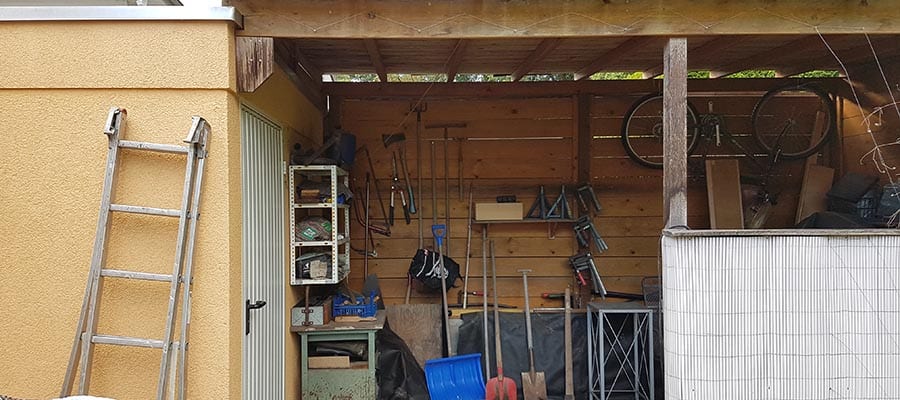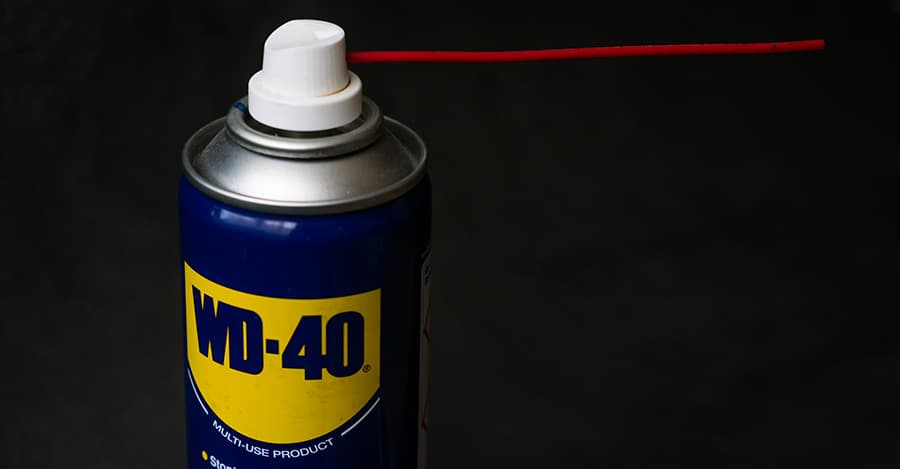Weed eaters can shred through all sorts of weeds, shrubs, grass, and more. Unfortunately, neglect and misuse can cause their longevity to be cut in half for many people. If you’ve left any tools or lawn care equipment out during a storm, you’ve probably noticed rust and corrosion starting to form.
A weed eater can get rained on if you use anti-rust spray, and you reduce the time it is exposed to the rain to a minimum. If you need to store the weed eater outside, it’s best to keep it under a protective covering like a tarp. You can fix a rusted weed eater with tin foil, water, and dish soap.
Throughout this article, you’ll find the following info about weed eaters getting rained on:
- Different probabilities if you leave your weed eater outside in the rain
- How to prevent your weed eater from getting damaged
- The best methods of fixing soaked lawn tools
What Happens if Your Weed Eater Gets Wet?
According to Thriving Yard, it’s okay for your weed eater to get a little bit wet, but none of them are waterproof. When they’re outside for too long, you might start to notice that rust, calcification, and corrosion become a problem. There are several other issues associated with leaving your weed eater out in the rain.
Here’s a list of what could happen if your weed eater gets rained on:
- Rust is the most common issue that you’ll have to deal with. Unfortunately, it’s one of the worst problems that can happen to weed eaters. If you’re working with a metal blade, then the blade will be slowed down and possibly break. On the other hand, if you have a string attachment, then it’s not as big of a problem.
- Corrosion is also likely going to happen if you have your weed eater outside during multiple rainstorms. Whether it’s caused by rust, calcification, or anything else, it’s not uncommon for corrosion to ruin lawn care equipment. It’ll eat away at the gears until the machine doesn’t turn on anymore.
- The oil and gasoline could get flooded. If you have a leaky gas cap, then the fuel will be diluted. Various results include smoking, failure to start, loud noises, and many other malfunctions that you don’t want to deal with. Always lubricate the O-rings to prevent fuel flooding and dilution.
- If it’s a plug-in weed eater (or battery-operated), it could ruin the machine. Electronics don’t mix well with water, which is why you need to keep battery-operated weed eaters away from moisture. If it’s raining outside, follow the instructions in the next section to protect your equipment.
- Discoloration is another common concern, though it’s not likely to damage the weed eater. It’ll make the surface of the machine a bit brittle, which will chip away at the paint. Discoloration and degradation are also caused by excess exposure to sunlight, so don’t leave a weed eater outside for too long.
As you can see, there are plenty of negative results that could occur if you leave your weed eater outside when it’s raining. Fortunately, you know all of the problems, so you’re less likely to allow it to happen.
If you want to know which preventative steps you need to take, proceed to the next section.
How Do You Keep It Safe During the Rain?
It might seem impossible to keep your weed eater safe when it’s raining, especially if you don’t have anywhere to store it inside the house. There are countless solutions to prevent rust, corrosion, and other problems associated with rainy days.
Let’s examine what you can do to keep your weed eater safe from excessive amounts of rain below.
- Purchase a tarp and hang it over all of your yard care equipment. If you want to keep your weed eater, mowers, and other gears safe from the rain, then a simple tarp will be more than enough. They’re often less than $20, but they’ll save you hundreds of dollars in the long run.
- Place the weed eater in a shed or garage. It’s likely that you already thought of this one, but it’s worth mentioning that you can get overhead storage and install it on the walls or roof of your garage. These racks aren’t too expensive, and they’ll keep the weed eater out of the way.

- Use a standing umbrella for temporary shelter. If you’re trying to keep your weed eater moisture-free, umbrellas are a no-brainer. Place it against the wall with the umbrella angled toward the direction that the wind is blowing. You’ll be able to keep it dry for the most part, which is much better than nothing at all!
- Consider applying a rust preventative spray or paint. One of the best products on the market for yard care equipment is the WD40 Specialist Corrosion Inhibitor Spray that you can find on Amazon. All you have to do is spray the solution on any exposed metal parts of the weed eater and let it sit for a few hours to dry.

There are many ways for you to take care of your equipment. Although they might seem tedious, a little bit of work goes a long way. When you’re talking about spending hundreds of dollars of lawn gear and very little on these accessories, it’s an easy choice every time.
For more information about fixing a weed eater that’s already been damaged from the rain, read on.
How to Fix a Wet Damaged Weed Eater
Sadly, we’re not always able to catch our gear getting soaked fast enough. If you walk outside the day after heavy rain and you forget your weed eater, then you’re in luck. It’s probably just soaked. Wait until it’s completly dry (this can take multiple days if it’s rainy and damp weather) and check if it’s working. If you have one that is fuel powered, you might need to check the spark plugs and make sure they are completly dry and clean.
If your weed eater stays out for a longer time, it will start to rust and get severely damaged. Especially electric weed eaters might stop working completely due to corroded cables inside.
Try this step-by-step process to get rid of the rust:
- Roll a ball off tinfoil until it’s tightly compacted to about the size of a golf ball. It needs to be dense enough to the point that it doesn’t indent when you push your thumb against it. This process requires quite a bit of elbow grease, so you need to make sure that it’s tough enough to handle it.
- Pour soap and hot water on the ball, ensuring that it’s sudsy. It’s important that there’s enough soap on the tinfoil ball that you can scrub away for a long time.
- Using circular motions, firmly scrub the rusted portions of the weed eater. It’ll take a few minutes, but you’ll notice the rust going away fairly quickly. Unfortunately, there’s nothing you can do about the corrosion that’s been caused by the rust.
- Once it’s all gone (or most of it), it’s time to use the rust inhibitor spray mentioned in the previous section. This spray should be thoroughly applied to all rusted and non-rusted parts of the weed eater. Even if the spot is dry, cover everything made out of metal to keep it safe for future rainy days.
Conclusion
Now that you know the causes and solutions of rusted weed eaters, you’ll be prepared for rainy days. Weed eaters can take a few rainy hours here and there, but they’re not designed to withstand the constant downpour. Next time you notice clouds brewing, follow the numerous suggestions found on this page.
Here’s a quick rundown of everything this post should’ve taught you:
- Weed eaters shouldn’t be left outside uncovered during the rain.
- Rust, corrosion, and calcification are caused by excessive amounts of water on your lawn care equipment.
- Consider using rust inhibitors to protect your weed eater.
- Remember to cover your yard gear with umbrellas, tarps, or garage racks for long-term storage.

